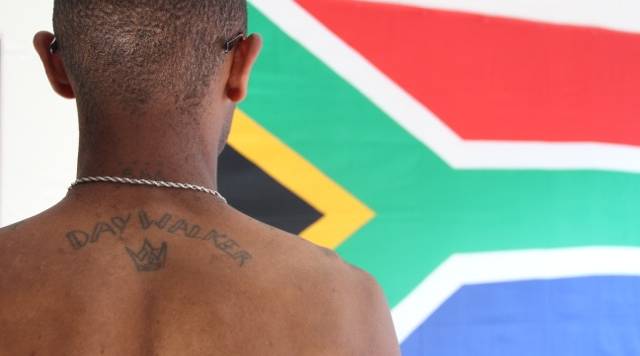
South Africa
Capital city — Pretoria
Country population
Incarceration rate (per 100,000 inhabit…
Type of government
Human Development Index
i2016/ UNDPName of authority in charge of the pris…
Total number of prisoners
Prison density
i2017/ Department of Correctional ServicesTotal number of prison facilities
i2017An NPM has been established
Female prisoners
i2017/ Department of Correctional ServicesPercentage of untried prisoners
i2017/ Department of Correctional ServicesDeath penalty is abolished
yessince 1997
Contact with the outside world
The number of visits inmates are allowed to receive per month, the duration and the type (contact or non-contact) depend on the security level of the prison and the “offender group” they are assigned to1.
Prisoners are searched after each visit. Visitors are searched before and after.
All visits are monitored and must take place within sight and earshot of an official.
For “non-contact” visits, a glass separates inmates from their relatives.
Visitors may bring inmates reading materials. They can purchase food items in the visiting area.
Mothers should be incarcerated close to their families to maintain ties, but it is not always the case. Conjugal visits exist on paper but are extremely rare in practice. On the whole, women are not visited as often as men.
To find out more about the visiting system in South African prisons, read a testimonial, written by Derrick Thulani, founder of the non-profit organization Zonk’izizwe Odds Development (ZOD).
Department of Correctional Services, Visitation process. ↩
Prisoners can send and receive an unlimited number of letters, but content is monitored. Prison officials check the letters whether incoming or outgoing.
Access to phone calls is given depending on the group privilege category for sentenced inmates. During the week, prisoners have to make a verbal or written request to make a call. It can be granted or denied. During the weekend, everyone is allowed to make calls.
Prison authorities are allowed to monitor phone conversations.
Prisoners in segregation rooms cannot see their families or correspond with them.
All inmates are eligible for parole, even if sentenced to life imprisonment (see the section “Life sentence”.
During the 2016/2017 period, 99% of parolees (51,161) did not violate their parole1.
The Department of Correctional Services (DCS) works on implementing the use of electronic monitoring: 1,454 persons were electronically tagged during the 2016/2017 period2 (870 during the 2015/2016 period3).
Department of Correctional Services, Annual Report 2016/2017, p. 32. ↩
Department of Correctional Services, Annual Report 2016/2017, p.32. ↩
Department of Correctional Services, Annual Report 2015/2016, p.36. ↩
The Department of Correctional Services fails to properly inform prisoners of their rights. For instance, inmates placed in solitary confinement are not made aware of their right to refer their case to the Inspecting Judge. They are also not informed of the fact that prison authorities cannot prevent them from contacting the Inspecting Judge.
Both the Correctional Services Act 47 (CSA) and the Criminal Procedure Act 48 are not always in line with the minimum standards for correctional facilities set out in the Mandela Rules United Nations Standard Minimum Rules for the Treatment of Prisoners.
The Constitution of South Africa. Section 35(3)(g) of the Bill of Rights provides that every accused person has a right to have a legal representative. State-funded legal aid is provided by Legal Aid South Africa. A “Means Test” is conducted in order to verify the person qualifies for the service. For example, a single person should earn less than R 5,500, and households less than R 6,000. Some traffic offenses are not eligible for public defence (driving without a license, driving under the influence of drugs or alcohol).
To find out more about legal defence is South Africa, consult the guide produced by the Wits Justice Project, “What you should know about your lawyer”.
South Africa ratified the UN Convention against Torture and Other Cruel, Inhuman or Degrading Treatment or Punishment (CAT) in 1998. The country signed the Optional Protocol to the CAT in 2006, but has not ratified it yet.
At present, only detention facilities are subjected to regular and independent monitoring by means of a visitor system, integrated into the Judicial Inspectorate for Correctional Services (JICS). However, its lack of independence and its limited mandate have been pointed out in the past1.
Thematic report on criminal justice and human rights in South Africa, a submission to the UN Human Rights Committee in response to the Initial Report by South Africa under the International Covenant on Civil and Political Rights at the 116th Session of the Human Rights Committee (Geneva, March 2016), p. 33. ↩